Kohei Igarashi
- Published
- 15 November 2014
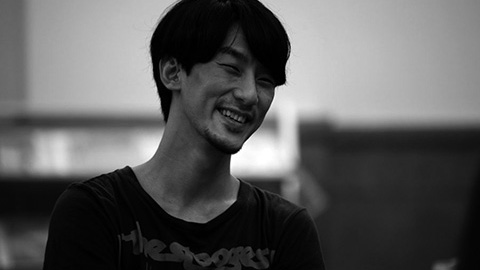
by Julian Ross
Set in the near future in December 2017, Hold Your Breath Like a Lover (Iki o Koroshite, 2014) is a hypnotic story on nightshift factory workers stuck in-between: life and death; dusk and dawn; choices made and choices to make. Still at unease after the unexplained death of their colleagues, the characters in the film drift about in a state of fugue as they search for ways to spend their empty days leading up to the New Year. As the recent memory of the space haunts its corridors, specters of the past make appearances as ghosts of the dead workers, to which the others respond not with fear but bemusing nonchalance. A marked contrast to his characters, director Kohei Igarashi displays assured control over his story that makes pointed references to Japan's sociopolitical present and the implications it holds for the future.
The only Japanese film at the festival, Hold Your Breath Like a Lover screened in the Concorso Cineasti del Presente section of the 67th Locarno Film Festival where Julian Ross, participating in the Locarno Critics' Academy, caught up with the young director to discuss his latest feature.
Your film is a graduation film for the MA course at Tokyo University of the Arts, where Kiyoshi Kurosawa teaches. Can you explain the teaching processes at the university?
As students, we were always working on one production or another at the university – whether it was shooting our own film or assisting others. In that way, it functions almost like a studio. Kiyoshi Kurosawa gave us classes but there wasn't a system in place as part of the school where he would advise us on our scripts or directing methods. Of course, we could approach him and other teachers for advice but I didn't do so myself for this film.
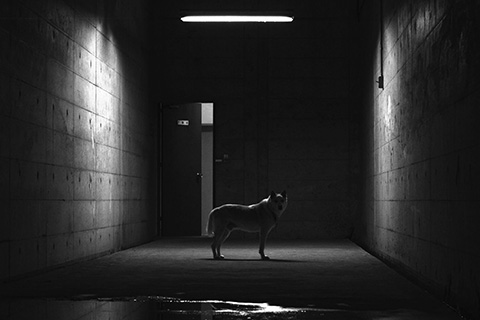
Hold Your Breath Like a Lover
The film is set in a particular time in 2017, approximately two years before the Tokyo Olympics and at the cusp of the New Year. How significant was this period as the setting of the film?
I wanted to capture the changing air in the moments before a shift. Not just of personal change for the characters but also of society at large, something that I feel Japan is currently experiencing.
You also make reference to the increasing militarization of Japan's Self-Defense Force with one of the characters, Gou, dressed up in combat gear. The film is set in the near future but speaks of pertinent issues in the immediate present.
I wrote the script in 2013 at which point I was already feeling like Japan was increasingly shifting gear to prepare itself for war. I began imagining my friends joining a war, which is increasingly becoming an actual possibility.
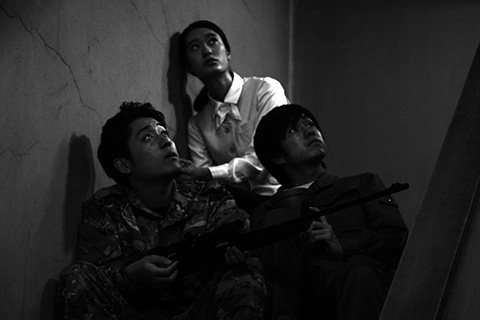
Hold Your Breath Like a Lover
The factory in which the film is entirely set seems to be the main character. Was it the location that gave you the idea for the film? Did you conduct research into the labour involved in the factory?
We went on a location hunt around different waste disposal factories. In Japan, these factories have alleyways specifically to take visitors and school children on tours. At each location, a tour guide took us through these corridors and gave us an explanation of the labour involved. We asked detailed questions, such as the amount of rubbish they would have on New Year's Eve and what the workers' hours were like on those days. In the end, we selected the one that gave us the strongest impression and elicited ideas for us just by being in the space.
The characters in the film move like ghosts, and the ghosts in the film move like humans.
I'm not sure whether this is specific to Japan, but I feel people are now living their lives without any vitality, refusing to take their lives into their own hands. Just like with the relationships depicted in the film, people seem to be unable to commit to anything.
Even the camera moves around the factory like a ghost.
The cinematographer Wataru Takahashi and I discussed prior to the shoot about how the camera should move. We wanted for the camera to inhabit its own point of view and move in ways that are unexplainable by the logics of perspective.
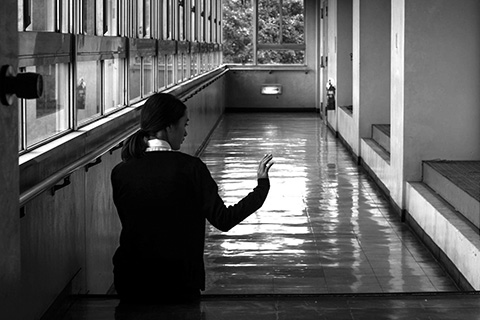
Hold Your Breath Like a Lover
It's a film that uses tropes of genre filmmaking, such as the ghost from horror films and allusions to science fiction. Yet, ultimately, the film doesn't feel like a genre picture.
During the process of writing the script, I didn't have any genre in mind but realized how steeped the film was in the genres that you've mentioned during the shooting of the film. Although it was unconscious, I'm often drawn to films that can transcend genres but are also able to allude to them or mix them together.
There is a pivotal dance scene in the middle of the film that recalls the last scene of Beau Travail (Claire Denis, 1999) in its eruption of motion in a film where the characters are mostly static.
I have seen many films by Claire Denis but not the particular one you've mentioned. The characters in the film move around with a sense of suffocation and I wanted to give them, in particular the character Tani played by Ran Taniguchi, a moment of release. My childhood friend specifically made the music for the scene, the title of which is directly taken from the title of this film.
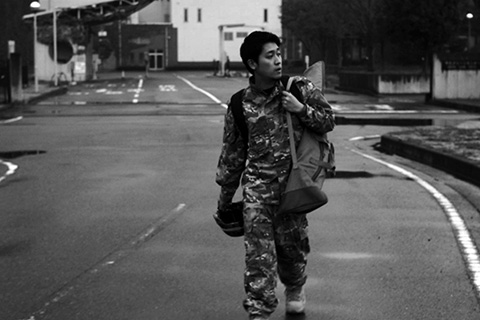
Hold Your Breath Like a Lover
Did you have any other filmmakers from whom you drew inspiration? One of your teachers, Nobuhiro Suwa, compared your approach to filmmaking to that of Pedro Costa.
I know, he really did (laughs). Although I don't think the end result is much like Pedro Costa's work, I'm inspired by his approach to filmmaking that seems organic and made during the production rather than prearranged. As I usually work with scripts written by others, this film was the first of mine that I wrote myself. Although it's necessary for funding, ideally I would like to work without a prewritten script as I feel it imposes a framework to the film that brings about limitations.
Another filmmaker I like is John Cassavetes, whom I discovered at precisely the time when I decided to become a filmmaker. The complex and humane way in which he depicts relationships is a true inspiration.
Are you working on your next project?
I currently work as a receptionist at a hospital and assist film productions where I can. I feel independent cinema in Japan is different to independent cinema elsewhere. While in most cases producers gather funding to get their independent film made, in Japan, we must pay out of our own pockets to make an independent picture. The situation is even difficult for established filmmakers. Even so, I'm looking forward to making my next picture.